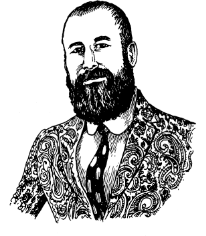Conceptual poet Kenneth Goldsmith’s work is simultaneously among the most mundane and the most maddeningly provocative writing being done today. In books like No. 111 2.7.93–10.20.96, a massive compendium of words and phrases ending with the r sound, alphabetized and sorted by length; Soliloquy, which documents every word he uttered in a week; The Weather, a transcript of an entire year’s worth of weather reports on news station WINS; and Day, for which he retyped the entire contents of an issue of the New York Times, Goldsmith has produced monumentally “boring” texts that shun all frills and artfulness. Yet on his radio show—where he broadcast for fifteen years as “Kenny G.,” a subtle shot across the bow of the easy-listening saxophonist who uses the same moniker—he aired audio performances of this very same work as the “Hour of Pain,” a direct challenge to the tolerance of the station’s listeners.
Goldsmith’s work forces a drastic rethinking of what a book or text can be. Incorporating elements of surrealism, concretism, and sound poetry, his writing takes pleasure in words as things of beauty (or manipulable items of data) in and of themselves. His texts—filtered and itemized—go well beyond traditional “list poems,” betraying an almost Asperger’s-like attraction to organization and categorization on a grand scale. His enthusiastic use of the advanced copy-and-paste techniques of the internet age pushes the limits of the postmodern remix or Situationist-style détournement. At the same time, his work is a comment on (and an undisguised cheering-on of) the obsolescence of authorship and originality.
Goldsmith teaches poetic practice and the art of plagiarism at the University of Pennsylvania. He is the editor of I’ll Be Your Mirror: The Selected Andy Warhol Interviews, and was a curator for the Whitney Museum of American Art’s The American Century, Part II: Soundworks. He has been awarded an Anschutz Distinguished Fellowship in American Studies at Princeton University. He is also the founder and publisher of UbuWeb, a vast online archive of avant-garde music, writing, and film, for which he won a Qwartz Electronic Music Award in 2009. A collection of his essays, Uncreative Writing: Managing Language in the Digital Age, was recently published by Columbia University Press.
Though Goldsmith and I are both producers at WFMU, and our children attend the same elementary school in Manhattan, I conducted the interview by email rather than face-to-face so we would have more time to mull over our questions and answers.
—Dave Mandl
THE BELIEVER: You say that your books don’t need to be read. What do you mean by that?
KENNETH GOLDSMITH: My books are better thought...
You have reached your article limit
Sign up for a digital subscription and continue reading all new issues, plus our entire archives, for just $1.50/month.
Already a subscriber? Sign in





